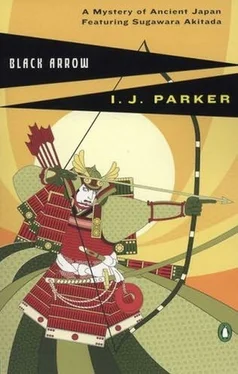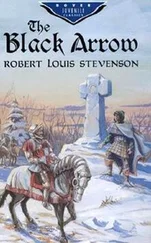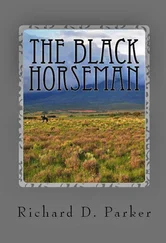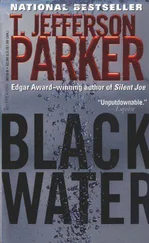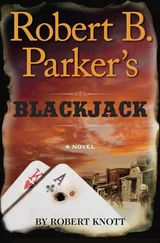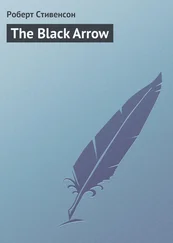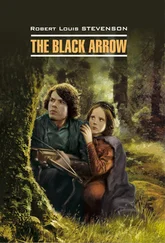I. Parker - Black Arrow
Здесь есть возможность читать онлайн «I. Parker - Black Arrow» весь текст электронной книги совершенно бесплатно (целиком полную версию без сокращений). В некоторых случаях можно слушать аудио, скачать через торрент в формате fb2 и присутствует краткое содержание. Год выпуска: 2006, ISBN: 2006, Издательство: Penguin, Жанр: Исторический детектив, на английском языке. Описание произведения, (предисловие) а так же отзывы посетителей доступны на портале библиотеки ЛибКат.
- Название:Black Arrow
- Автор:
- Издательство:Penguin
- Жанр:
- Год:2006
- ISBN:9780143035619
- Рейтинг книги:5 / 5. Голосов: 1
-
Избранное:Добавить в избранное
- Отзывы:
-
Ваша оценка:
- 100
- 1
- 2
- 3
- 4
- 5
Black Arrow: краткое содержание, описание и аннотация
Предлагаем к чтению аннотацию, описание, краткое содержание или предисловие (зависит от того, что написал сам автор книги «Black Arrow»). Если вы не нашли необходимую информацию о книге — напишите в комментариях, мы постараемся отыскать её.
Black Arrow — читать онлайн бесплатно полную книгу (весь текст) целиком
Ниже представлен текст книги, разбитый по страницам. Система сохранения места последней прочитанной страницы, позволяет с удобством читать онлайн бесплатно книгу «Black Arrow», без необходимости каждый раз заново искать на чём Вы остановились. Поставьте закладку, и сможете в любой момент перейти на страницу, на которой закончили чтение.
Интервал:
Закладка:
I. J. Parker
Black Arrow
PROLOGUE
Echigo Province, Japan:
Leaf-Turning Month (September), A.D. 981
The evening sun slanted through the branches of tall cedars and splashed across a bloodred maple on the other side of the clearing. From the valley below came sounds of horses and shouts of men.
A young woman emerged from the trees, leading a child-a boy, no more than three years old, in bright blue silk and with his hair childishly parted and tied into loops over his ears. The young woman was slender and beautiful, and dressed in a costly white silk gown embroidered about the hem and full sleeves with nodding golden grasses and purple chrysanthemums. Her long hair, which almost reached the hem of her dress, was fastened with a broad white silk ribbon below her shoulders.
In the middle of the clearing the child pulled free to chase a butterfly. The young woman called out anxiously, then laughed and ran after him.
From the thicket, Death watched the two with hot eyes, clasping the large bow with his left hand, while the right slowly reached over his shoulder to pull the long, black-feathered arrow from the quiver slung across his back.
The boy lost the butterfly and turned toward the woman, who sank to her knees and spread her arms wide to receive the child.
Death bared his teeth. He was close, his bow powerful, the arrow special. With luck it might take only the one shot. He placed it into its groove, pulled back firmly, and aimed.
With a shout of laughter the boy hurled himself into the waiting arms, and Death released the long steel-tipped missile. He watched as it found its mark just below the silken ribbon in the woman’s black hair, heard the muffled blow clearly in the sudden silence, and watched as she fell forward, slowly, burying the small figure of the child beneath her. Heavy silken hair slipped aside, and a large red stain appeared on her white silk gown, spreading gradually from the black-feathered arrow like a crimson peony opening its petals in the snow.
Even the birds had fallen silent.
Death remained frozen for a few moments, watching, listening. But there was neither cry nor movement under the white silk, and he slowly lowered the bow.
The silence was broken by a small bird’s voice, then by the humming of insects and distant shouts of the hunting party in the valley. Death quickly left the clearing.
ONE
Echigo Province, Japan
Gods-Absent Month (November), A.D. 1015
Two men armed with hunting bows rode single file down the steeply sloping track toward the dark huddle of buildings on the plain below. They hunched into heavy clothing against a sharp wind that swept across the black-and-gray landscape of rock, evergreens, and sere grasses. Below them the black roofs of the town were a blot in a wintry plain, and beyond the plain a pewter ocean stretched toward a distant line where it melted into the murky grayness of low clouds. A highway ran along the shore. Behind the horsemen rose mountains, their tops hidden in gray vapor.
The prospect was dismal.
Most of the town straggled along the black line of the highway, which looked not unlike a dead snake with a large rat bulging its middle. The rat bulge contained the tribunal and a small temple, surrounded by low, steep-roofed houses-the center of Naoetsu, capital of Echigo province.
This was the rough north country, won only recently from its barbaric inhabitants and not yet fully civilized. In the short summers, the plain between the mountains and the ocean was green with fields of rice, ramie, and beans, and the ocean dotted with fishing boats. Echigo was a fertile province, but now it prepared for the long winter, when a thick blanket of snow covered the land, and men and beasts lived like bears inside their homes until the snow melted in the spring.
The rider in front, a muscular man with a neatly trimmed graying beard and the sadness in his eyes that attracts women, looked out at the choppy sea and up at the roiling sky. The wind was bitterly cold. He called over his shoulder, “Looks like snow.”
“Smells like it, too.” His younger companion in the bearskin coat gave a shiver and pulled his handsome face back into his collar like a turtle. A string of birds dangled from either side of his shaggy pony’s neck. “Nothing like we expected, is it, Hito?” His voice was muffled by the fur.
“Few things are. The master was sent here to set things right.”
“It’s another trap, I bet,” grumbled the young man into his bearskin. His name was Tora, or “Tiger.” He had chosen it years ago when his birth name had become a problem. Fifteen years Hitomaro’s junior and from peasant stock, he had served their master longer and was closer to him. Hitomaro-Hito for short-had only joined them a few months ago in the capital, along with his friend Genba.
“How so?” asked Hitomaro.
“Reminds me of Kazusa. He was meant to fail there, too, but he was hot to succeed, sure it would make his career. They sent him on a wild goose chase, hoping he’d screw up. He gave ‘em a black eye instead.”
“This time his friends got him the assignment.”
“Don’t you believe it. This is much worse. They’re letting him fill in for some prince who’s taking his ease in the capital and raking in most of the income. Only this time they made sure they tied both the master’s hands behind his back so he couldn’t defend himself. And then they hobbled his feet so he couldn’t get away. What gets me is he’s all fired up again anyway.”
“Then he’ll succeed just like last time.”
“With just the three of us? When the whole province is about to rise up in arms against him?”
“You don’t know that. And we are four. You forgot Seimei.”
“Amida, brother! That old man’s never held a sword or a bow. Even her ladyship can at least ride a horse.”
“Seimei is smart. Stop complaining, Tora, and let’s move on. We’ll have to cook the birds tonight.”
“Heaven help us,” muttered Tora. “I wish we could make Genba do it. He likes food.”
Hitomaro, who had reached level ground, urged his horse into a trot. He called back, “Genba eats. He doesn’t cook.”
Tora followed. If the truth were known, he was by nature an optimist but he hid his confidence in hopes of impressing the older and more worldly wise Hitomaro with his experience.
On the outskirts of the city they encountered a disturbance at a mangy hostel called the Inn of the Golden Carp. The place was, despite its fancy name, a mere collection of low hovels, the sort that serves bad food in skimpy portions but generous helpings of vermin.
“Wonder what’s going on there?” Tora’s face emerged from his bearskin as if he smelled excitement.
Hitomaro spurred his horse, scattering the gaggle of people staring through the gate, and rode into the inn yard. Tora followed, and so did the spectators. A constable in a patched brown jacket and dirty trousers met them. “Nobody’s allowed,” he cried, waving his arms. “Disperse. By order of Judge Hisamatsu.”
Hitomaro and Tora ignored him and dismounted. They tied their ponies to a post, but the constable drew his jitte and barred their way, swinging the two-pronged metal weapon at them.
“Hey! I said …”
Hitomaro growled, “Put that toothpick down and stand aside. By order of the governor.” Sweeping the man out of his way, he stalked past him into the main hovel.
Tora slapped the constable’s shoulder with a grin. “Didn’t recognize us? Keep an eye on our birds, will you?” He pointed to the string of freshly killed quail and doves.
Inside, a dank stone-flagged passage led past the kitchen toward a large common room. An odor of dirt and garbage hung about the place. No point in removing shoes; the floors were either stone or dirt and could have used a sweeping out.
Читать дальшеИнтервал:
Закладка:
Похожие книги на «Black Arrow»
Представляем Вашему вниманию похожие книги на «Black Arrow» списком для выбора. Мы отобрали схожую по названию и смыслу литературу в надежде предоставить читателям больше вариантов отыскать новые, интересные, ещё непрочитанные произведения.
Обсуждение, отзывы о книге «Black Arrow» и просто собственные мнения читателей. Оставьте ваши комментарии, напишите, что Вы думаете о произведении, его смысле или главных героях. Укажите что конкретно понравилось, а что нет, и почему Вы так считаете.
